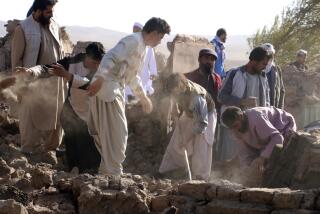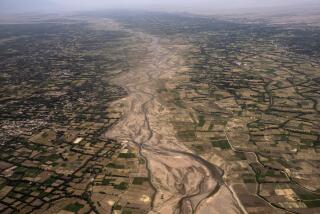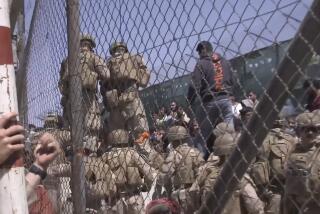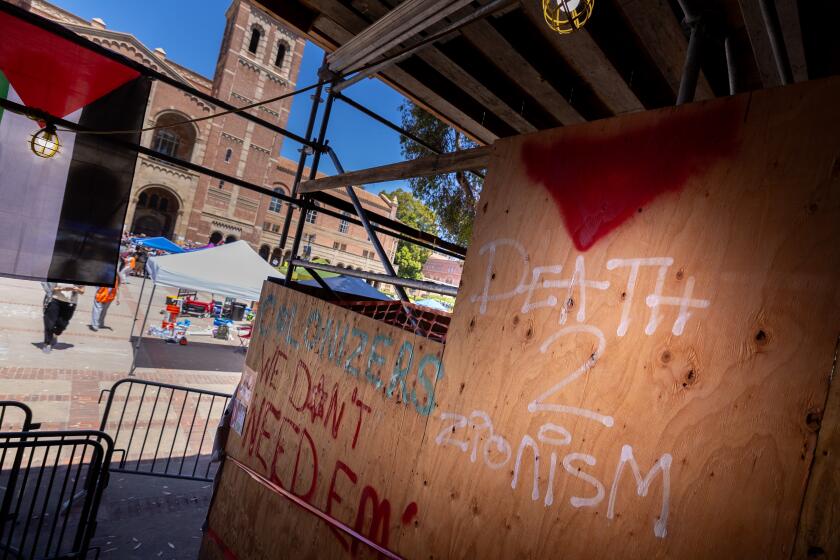U.S. to Probe Bombing of Hide-Outs
Facing questions about dozens of alleged civilian deaths, Pentagon officials said Monday that they would investigate the bombing in eastern Afghanistan of a complex of caves and tunnels where terrorist leaders are believed to be hiding.
Afghan villagers and local officials have alleged that U.S. forces flattened hamlets near Jalalabad while systematically bombing the suspected hide-outs of leaders of the Al Qaeda terrorism network.
Pentagon officials insisted that they had no evidence to support the allegations, and they suggested that the accusers may be secret supporters of Al Qaeda or that the deaths may have been caused by Taliban forces.
Meanwhile, U.S. warplanes intensified their bombing of Kandahar, the last Taliban stronghold, in support of Afghan opposition forces closing in on the southern city.
In the country’s north, opposition leaders warned a pocket of 2,000 Taliban fighters near Balkh that they must surrender or face attack.
And a U.S. official said at least three prisoners believed to be Americans are among the Taliban members who remain in custody in Mazar-i-Sharif.
U.S. Says No Evidence of Bombs Gone Awry
The charges of civilian deaths came from villagers near the mountain cave complex called Tora Bora. Some witnesses and survivors say more than 200 villagers and friendly soldiers died in bombing raids over the last three days.
Villagers in one town said they have unearthed, identified and buried in mass graves more than 150 of their neighbors.
But U.S. defense officials said they have repeatedly checked their strikes and have found no evidence that any bombs went awry.
Rear Adm. John D. Stufflebeem, a senior military planner, said at a Pentagon briefing that the bombs were dropped after “terrific, traditional, consistent planning to ensure that only these targets were struck.”
He said that the loyalty of some tribal chieftains in the area is not clear and that according to reports from the region, “this is an area where Osama bin Laden has been using some of his wealth to buy local chieftains’ support.”
He said the military’s own intelligence reports showed nothing to suggest that any towns in the area had been struck. “So I find it all a little bit suspect to hear that villages are being flattened,” he said.
Another senior defense official said that after several days of checking, military officials remain “pretty comfortable” that the bombs struck legitimate military sites. Yet the reports are “confusing,” the official added. “We’re going to have to walk this dog back and find out why.”
In the women’s ward of a public hospital in Jalalabad on Monday, seven women, little girls and babies lay bloodied and unconscious. Two toddlers sprawled toe to toe in a single cot. A baby wailed, its face spattered with blood. All were injured in the attacks on the town of Landakhel the night before, their rescuers said.
“We’re just civilians. We are very poor,” said Niaz Mohammed, a 40-year-old farmer who said 12 of his family members were killed when his house was bombed. “They are not aiming their bombs correctly, and we are very angry.”
Patience Running Out in Tora Bora
On Monday afternoon, 200 tribal elders gathered at a Jalalabad mosque for fiery speeches and prayer sessions.
“War is evil. War is unholy. There is no holy war,” said Mohammed Hazrat Faqirbad, a tribal elder from Falheabad. “It makes our women widows and beggars. No more.”
Separately, the security chief of anti-Taliban forces in northeastern Afghanistan said more than 1,000 fighters were about to move into the Tora Bora area to search for terrorists.
Hazrat Ali said the force wants to “get in there and stay there until the last sigh of terrorism is gone. We will have an offensive against them, and this is war. But I want them alive.”
Last week, tribal warlords who nominally control eastern Afghanistan urged the foreign fighters to climb down from Tora Bora and hand over their guns. Those negotiations have proved fruitless--and patience is running out as U.S.-led bombing attacks ravage the countryside around the mountain hide-out.
U.S. officials were still trying to confirm the nationalities of the three pro-Taliban prisoners reported to be Americans. The three were among the survivors of a prison uprising near Mazar-i-Sharif that was quelled after hundreds were killed by the Northern Alliance and U.S. bombers.
The first man to emerge, speaking American-accented English and calling himself Abdul Hamid, was identified as John Phillip Walker Lindh of California. He is being held by U.S. forces, a spokesman for the U.S. Central Command said.
Two more men believed to be Americans have also emerged, the U.S. official said. They have not been turned over to U.S. authorities. Northern Alliance commanders have reserved the right to question prisoners first, although CIA agents have participated in interrogations in the past.
Near Kandahar, opposition groups were probing Taliban defenses even as they were simultaneously talking to Taliban officials to test their willingness to surrender, U.S. defense officials said.
Stufflebeem said most of the Taliban’s remaining military supplies are in the region, including shoulder-mounted antiaircraft weapons that target U.S. warplanes.
U.S. airstrikes were said to be especially intense late Monday around Kandahar’s airport to the south, where an anti-Taliban force trying to capture the facility met stiff resistance from mainly Arab defenders.
The force, commanded by Gul Agha Shirzai, a former governor of Kandahar province, withdrew for the night to an area about half a mile southeast of the airport’s main perimeter fence.
“We’ve underestimated them a bit,” said Khalid Pushtoon, a close Shirzai aide, in a satellite phone interview Monday evening. “We’re trying our best, but they are fanatical. They don’t care. They are suicidal.”
Northwest of the city, however, a second force under the command of prominent tribal chief Hamid Karzai continued its advance, moving close to the town of Arghandab, five miles from Kandahar’s outer suburbs.
According to one report, Karzai’s fighters advanced with almost no armed resistance. However, when a journalist contacted the Karzai group late Monday by satellite phone, he was told fighting had broken out around Arghandab. It was not possible to corroborate the account.
It is unclear how many Taliban fighters are inside Kandahar, but it is believed that thousands may have retreated there after the movement’s leader, Mullah Mohammed Omar, ordered them to give up vast stretches of land to the Northern Alliance.
Travelers reaching the Pakistani border areas from Kandahar on Monday said the city had undergone some of its worst bombardment over the weekend. A Taliban government driver said the strikes had killed more than 15 civilians and a far larger number of Arabs fighting with the Taliban. He also said vehicles traveling the main road linking Kandahar with the south had been attacked by helicopter gunships.
Surrender Deadline Set for Noon Today
Braving the season’s first bitter snow, more than 1,000 Northern Alliance soldiers massed outside the northern town of Balkh on Monday and issued an ultimatum to the 2,000 Taliban fighters gathered there: Lay down your arms voluntarily or prepare to do battle.
The Taliban forces, concentrated in the towns of Balkh and Chemtal, retreated a week ago from Kunduz, the Taliban’s last stronghold in the north. Since then they have set up camp in the two towns and have yet to surrender to the alliance.
The three top commanders for northwestern Afghanistan--Abdul Rashid Dostum, Ata Mohammed and Haji Mohammed Mukhaqiq--met for several hours with village elders from Balkh in a van parked at the alliance’s last checkpoint in Zain-i-Qala as their troops huddled under blankets to keep warm.
About two dozen U.S. military advisors and Special Forces troops stamped their feet in the cold and waited for the outcome of the negotiations.
The generals emerged and said they had given local Taliban leaders until noon today to surrender.
“We don’t want to have a military operation there. We want them to surrender. If not, we’ll take adequate measures,” Ata said.
*
Richter reported from Washington and Marshall from Quetta, Pakistan. Times staff writers Megan K. Stack in Jalalabad, Maura Reynolds in Zain-i-Qala and John Hendren in Washington contributed to this report.
More to Read
Start your day right
Sign up for Essential California for news, features and recommendations from the L.A. Times and beyond in your inbox six days a week.
You may occasionally receive promotional content from the Los Angeles Times.







